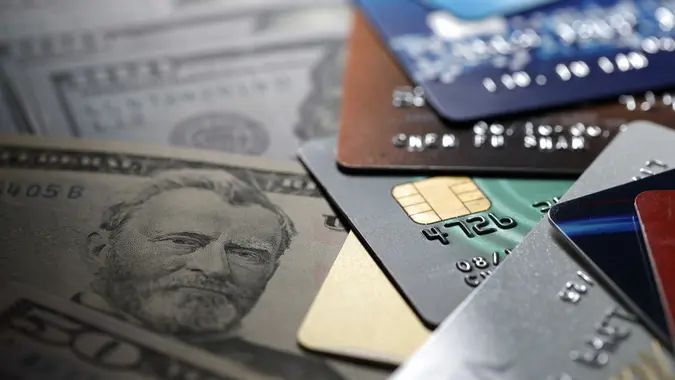With Inflation Stabilizing, Are Credit Cards Still a Good Safety Net?

Commitment to Our Readers
GOBankingRates' editorial team is committed to bringing you unbiased reviews and information. We use data-driven methodologies to evaluate financial products and services - our reviews and ratings are not influenced by advertisers. You can read more about our editorial guidelines and our products and services review methodology.

20 Years
Helping You Live Richer

Reviewed
by Experts

Trusted by
Millions of Readers
After several years of steep inflation has stressed many American households, the inflation rate has hit a normal range of 2.6% in October 2024, according to the Bureau of Labor Statistics’ Consumer Price Index. Additionally, the Federal Reserve has lowered interest rates, suggesting the economy is in a more stable place.
Despite things leveling out, credit balances continue to rise, according to a TransUnion report, meaning Americans are still relying on their credit cards quite a bit.
Consumers may wonder if lower inflation means it’s a better environment to use credit cards as a safety net. Credit experts weighed in.
Credit Cards Are Not a Reliable Safety Net
While most American consumers will need to use credit cards at one point or another in difficult times, according to Lori Pollack, executive director of the Financial Counseling Association of America (FCAA), “It’s never recommended to rely on credit cards, no matter what the economic environment.”
While she acknowledged that in times of need, with no savings to draw from, a credit card can certainly make the difference between keeping food on the table or going hungry, she cautioned that “the existence of the credit limit makes that a finite option unless you also pay down the balance every month.”
They’re Useful When You’re Paying Them Down
If the card is being used for actual emergencies, then consumers should make sure to at least pay the minimum monthly payment on time and refrain from using additional credit until their utilization rate (which is 30% of a FICO score) is back under 30% of their limit, Pollack urged.
OK in Lieu of Payday Loans
One of the few times a credit card is better than the alternative, Pollack stated, is when it’s a choice between credit and a payday loan.
“While interest rates on payday loans vary by state, annual payday loan interest rates typically range from 140% to 662%,” she said.
If You’re Using Them To Build Credit or Earn Points
Responsible use of credit cards, which means making timely payments and keeping your usage rate low, will help build credit, according to Martin Lynch, president of FCAA.
Additionally, there are some advantages and perks that come with using a credit card, such as cash back and rewards points, according to Lisa Ohnemus, director at Consumer Credit of Des Moines.
However, you’ll really only truly reap these benefits, however, if you’re paying balances off promptly and tracking spending, she said.
Only If You Use Them Responsibly
It’s wise to think of credit cards as more of a bridge between paychecks or lean times than an actual safety net, because, Ohnemus pointed out, “Irresponsible use of credit will harm one’s credit score and make it more difficult to get credit at reasonable rates in the future. Outstanding debt builds up quickly and can easily run out of control if one is not paying attention.”
Worst case scenario, Ohnemus said, “[U]sing credit cards for everyday expenses often results in the account balances growing steadily toward the limit, slowly but surely overwhelming the household budget.”
Consumers should keep credit utilization to no more than 30% of their credit limit, she said.
Consider These Alternatives
Before turning to your credit card, consider loans from family or friends instead, which Pollack called “a much safer alternative.”
Additionally, you can look into ways of adding income, such as getting a part-time gig, asking for overtime hours or selling unwanted household or personal items, all temporary methods.
Avoid These Alternatives
There are some alternatives to credit card debt that Pollack and her organization do not recommend, such as borrowing against your home or drawing money from a 401(k) simply to repay credit card balances.
“Yes, the interest rate on a home equity loan will be lower than your credit card rate, but doing so will mean you’ve converted an unsecured loan into one secured by your home, putting it at risk,” Pollack said.
Withdrawing funds from a retirement plan means that money can’t grow for when you really need it, Pollack added.
Work Toward an Emergency Fund
Instead, Ohnemus said,a great first step is establishing a small emergency fund as a financial safety net.
“Begin with a modest amount and gradually increase it over time.”
Delay Purchases
Lynch also urged consumers to think about “needs and wants” when making a purchase.
“Can the purchase be delayed? Did the consumer seek the best price for the needed product/service? Were all other options exhausted before using one’s credit card?”
Wait For Credit Card Rates To Come Down
If you must rely on credit cards, consider waiting for credit card companies to lower their rates, something that tends to happen in a low-inflation environment when demand is lower.
“However, it’s still wise to avoid carrying balances, as lower rates can lead to overconfidence in spending and potentially result in unmanageable debt,” Ohnemus said.
In short, it’s better to think of credit cards as a last resort, unless you can pay them off quickly, than a true safety net.
 Written by
Written by  Edited by
Edited by 

























